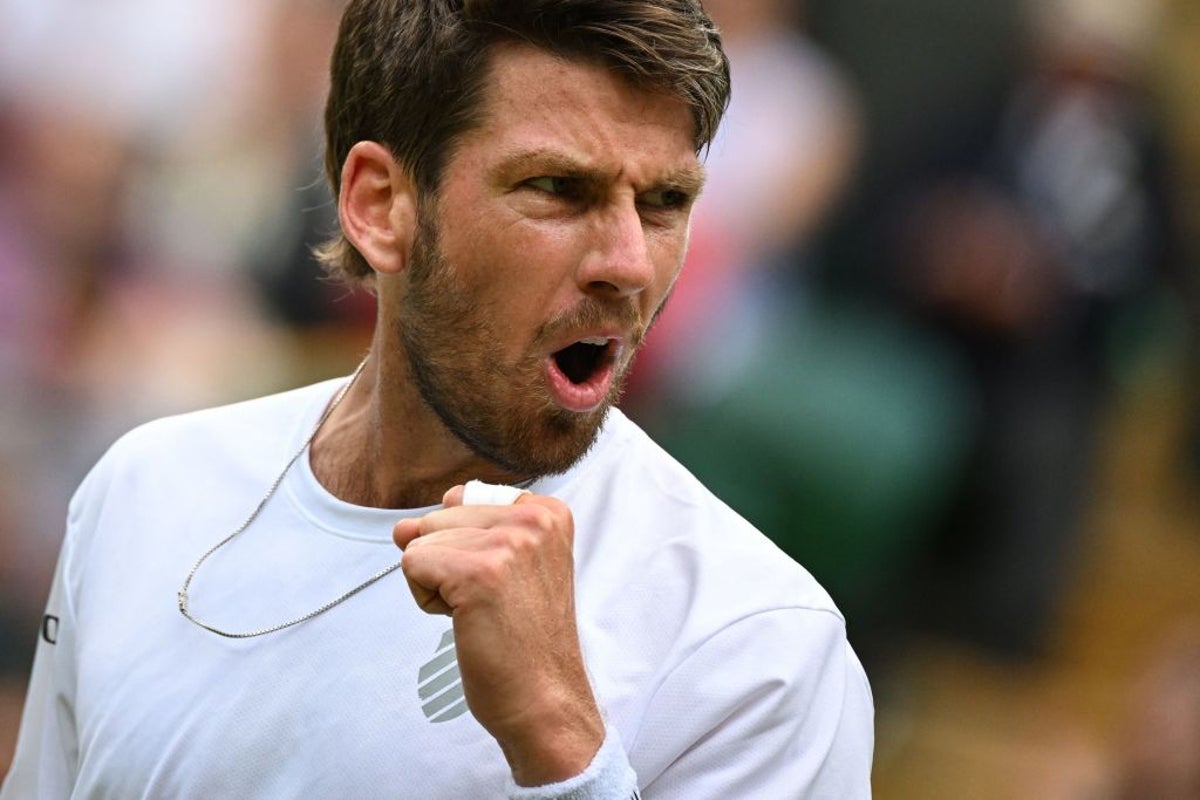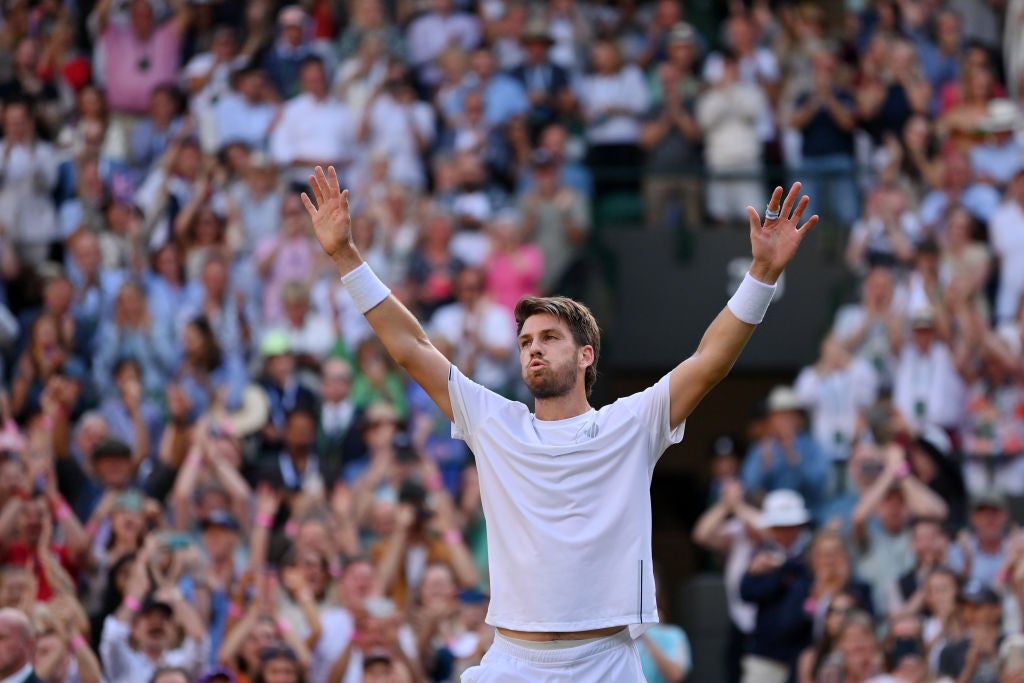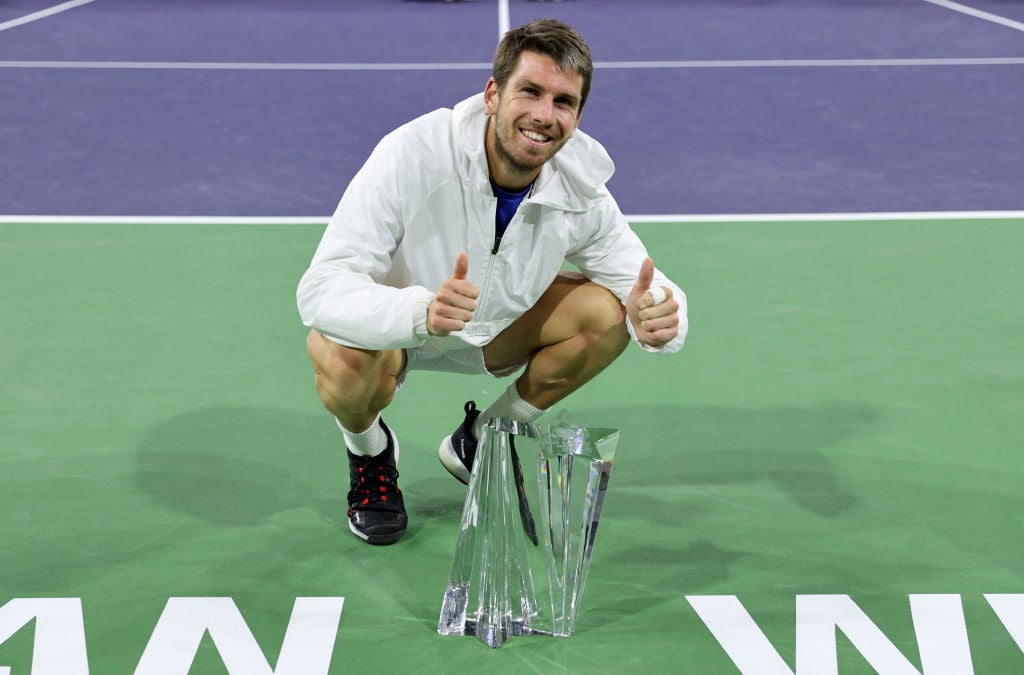
“It’s pretty interesting,” Cameron Norrie replied, as the British No 1 and the hope of Wimbledon was asked how British he really felt. A tennis player born in South Africa to a Welsh mother and Scottish father, raised in New Zealand and whose college education took him to the United States now carries the weight of a nation at the All England Club. As the question implied, though, which one? “My background is obviously from various places,” Norrie went on. “But I’m living here, based here...”
There would be no question as the emotion poured out on Court No 1, following Norrie’s stunning five-set victory over David Goffin in the quarter-finals. It means there will be a British semi-finalist at Wimbledon, with Norrie becoming just the fourth man in the open era to reach the final four of the Championships. Standing in his way is the six-time champion Novak Djokovic, who has extended his five-year winning run at Wimbledon to 26 matches. Norrie, the unassuming 26-year-old, can no longer attempt to fly under the spotlight that his unheralded rise to the top level of the sport had yet to grab.
That will now change. Norrie arrived in SW19 as the top-ranked home player but found himself opening his tournament out on Court No 2 at 11am, while centre stage was reserved for Andy Murray and Emma Raducanu. Not that he complained. Norrie does not seek attention or headlines. He does not have a flashy game and it is rather his work ethic and diligence in improving his fitness that helped fuel his rise through the rankings.

“He’s the definition of somebody who squeezes the lemon,” said Liam Broady, who fell at the third round of Wimbledon where Norrie progressed. “He is so low-key, under the radar,” added Heather Watson, whose defeat on Sunday left Norrie as the last Brit standing. “I think he deserves more attention firstly because he’s such a great example,” Watson went on. “His work ethic, his focus, his dedication, how he invests in himself...”
For Norrie, a first appearance in the fourth round of a grand slam was quickly followed by a semi-final, and is a further mark of his development which has slowly earned him new fans during his five victories at Wimbledon so far. “I’m enjoying the challenge of taking it level by level,” Norrie said. “It’s been a nice, steady progression. I want to keep pushing for more.”
Norrie does not have an overwhelming weapon and there is not a part of his attacking game that would be considered inside the top 20 in the world. What he does have, though, is easy to get behind, especially for a British crowd. Norrie’s effort and defence behind the baseline created energy in Centre Court during his third-round victory over Steve Johnson - as well as a new chant. “Norrie, Norrie, Norrie - Oi, Oi, Oi!” was the cry, and for those members of the crowd watching the British No 1 for the first time, it would have been hard not to fall for an engaging, committed performance.
Still, you could hear their surprise when Norrie answered the opening first question of his post-match interview on Centre Court. The distinctive vowels of his New Zealand accent spoke of his unlikely path to becoming a home favourite at Wimbledon. Norrie was three years old when his parents - both microbiologists, father David from Glasgow, mother Helen from Cardiff - moved to Auckland from his birthplace of Johannesburg. They were both former squash players, and although Norrie played a variety of sports growing up it was tennis that stuck.

The decision to represent Great Britain came when Norrie was 17 years old. The LTA’s national tennis centre in Roehampton was able to provide better opportunities to support Norrie’s junior career but when he needed to take the next step Norrie chose an unconventional route. He became a Horned Frog, enrolling at Texas Christian University in Fort Worth, and would go onto become the No 1 ranked college player in the NCAA by his junior year.
A moped crash in his second year after “a pretty big night and definitely a couple too many” resulted in six stitches in his chin and a missed pro tournament. “It was a realisation that I was kind of not doing it the way I wanted to do it and making not the best decisions,” he says now. “I was going out more than I probably should have been, like a typical student there at TCU, enjoying myself a lot. After that the coaches really kicked me into gear and I was definitely more professional after that. I grew up a lot after that. From then on, I was like, OK, I want to play tennis and commit to that and do that.”
He turned professional in 2017, entered the top 200 the following year, and was established in the top 100 by the end of his second full season. Norrie, although understated, is confident of his own abilities and when asked ahead of the 2021 campaign to name a player who would have a breakout year, his answer was himself.
Last year saw several deep runs in ATP tournaments, four finals and two additional titles - including one of the most prestigious events outside of the grand slams at Indian Wells in California. Norrie, who has always set high goals for himself, continued to tick his own boxes and reached the top 10 in the world, but his ranking was not reflected by a change in stature.

Norrie returned to Indian Wells in March as defending champion, only to be shoved onto the smaller outside courts in favour of the bigger names taking centre stage. “It didn’t show much respect,” Norrie said, and there are similarities between that slight and what he dealt with upon arriving at Wimbledon.
The tennis, though, has done the talking and Norrie has moved through the gears since surviving a five-set epic against Jaume Munar in the second round. Norrie was impressive in his straight sets wins against Johnson and then his good friend Tommy Paul. “I feel like I’m improving and my level is getting better,” Norrie said, and after replicating Murray and Tim Henman by reaching the semi-finals for the first time, he will believe his Wimbledon journey is not over yet.







